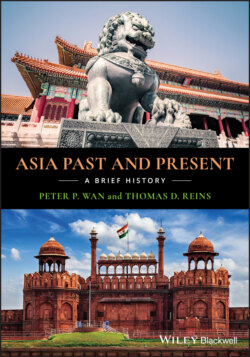Читать книгу Asia Past and Present - Peter P. Wan - Страница 53
Confucianism and the System of Imperial Examinations for the Civil Service
ОглавлениеThe System of Imperial Examinations for the Civil Service was introduced in the Han, strengthened in the Sui, and fully developed in the Tang. The Tang government, eager to reestablish Confucianism as the state ideology after it had been losing ground to Buddhism during the Northern and Southern Dynasties, founded state‐run universities to teach Confucian courses, and strengthened the Imperial Examination System. The exams tested the candidates on their knowledge of Confucian classics and their ability to apply its principles to solve contemporaneous issues. Successful candidates would be reviewed by the ministry of officeholders and appointed to government office according to their ability. These candidates had been trained in the basic skills of reading and writing and the Confucian and Legalist schools of statecraft, and indoctrinated to be loyal to the emperor. It was a meritocratic system: Its measure of a man’s qualification for office was his merit, not his birth. It ensured that the emperor would have the best and brightest men in his service. And since a blue bloodline alone would no longer qualify a man for high office, it broke the monopoly on government office by aristocratic families and opened up opportunities to the common man.
Now a direct link connected the mastery of Confucian scholarship and the holding of government office, which also meant access to personal wealth and power. Henceforth, young scholars would flock to state and private academies to study Confucianism with the express purpose of passing the exams and acquiring an appointment to government office. This was a uniquely Chinese route to upward mobility.
In theory, the imperial examination system was open to all men—rich and poor, high and low in birth. In practical terms, it was generally true that only upper‐class families could afford to provide their children with an education that would take a decade or two to complete. But there were always the lucky few, who, coming from lowly families, had the talent and opportunity to rise in legendary fashion to the very top. Poor talent could often draw on the wealth of his extended family or of the prosperous local landowners or merchants to pursue an academic and bureaucratic career.
In general, the examination system herded talented and ambitious young men into the bureaucracy in the service of the emperor, and the bulk of the candidates thus recruited would make competent bureaucrats loyal to the emperor. But it had an unintended consequence: A man could fail in the imperial examinations, turn his resentment against the establishment, and join the opposition or even join a rebel force. There would be more than a few such cases.
